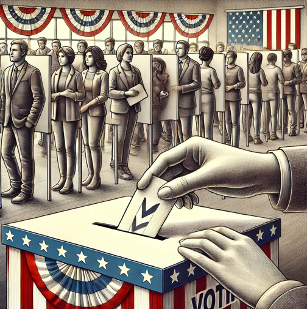Democracy
(Published in the newspaper Amigoe on the 20th of November 2024)
The previous article talked about the Trias Politica. It’s all about dividing the government into three parts: the legislative, the executive, and the judiciary. Democracies are built on this idea. In a democracy, the people rule themselves. The word “demos” comes from the Greek and means “people.” In a direct democracy, citizens vote on everything, from laws to who gets appointed. In an indirect democracy, citizens elect representatives to do that for them. In a democracy, what’s a minority today could be a majority tomorrow. It also lets different governments come and go peacefully, bringing fresh ideas and energy.
Forms of indirect democracy
Two ways people get to make decisions indirectly are parliamentary democracy and presidential democracy. In a parliamentary democracy, folks vote for the parliament. The government, which is the executive branch, gets its power from the trust of the parliament. Countries like the Netherlands and Germany are examples of parliamentary democracies. Curaçao also has one!
In a presidential democracy, both the parliament and the president are chosen by the people. The government is led by the president and can’t be kicked out by parliament. Important political decisions often need the approval of parliament. So, the government has to work with parliament. Examples of presidential democracies are the United States and Colombia.

Voting
The democratic rule of law
A country isn’t just a democracy when it comes to voting for parliament and the president. There’s a lot more to it! We’re thinking of things like advisory bodies, complaints procedures, information sharing, civil society, and human rights. Here’s a more detailed look at the key institutions that make a democracy work.
Advisory bodies
Our society is super complex these days, and a democracy needs strong, independent institutions and programs that can help it out with knowledge and insights. For instance, we’re thinking of advisory bodies. Some really important advisory bodies on Curaçao are:
- The Advisory Board (RvA). The main task of the Advisory Board is to advise on draft statutory regulations.
- The Socio-Economic Council (SER). The SER is a permanent advisory college with the task of advising the government and parliament on the socio-economic policy to be implemented, matters of a socio-economic nature and on statutory regulations of a socio-economic nature.
- The General Court Of Auditors (Algemene Rekenkamer). The General Court of Audit examines the income and expenditure of the government and, among other things, examines whether the policy as intended has been implemented.
- The Monuments Council. The Monument Island Ordinance 1990 states: "There is a Curaçao Monuments Council, whose task is to provide the Board of Directors with information on matters relating to monuments or city and village views upon request or on its own initiative."
Complaints about the government's actions
In a democracy, citizens have the right to complain if they think the government isn’t acting fairly. To make this happen, the Ombudsman was created. Anyone can ask the Ombudsman to look into how an administrative body handled a particular situation.
Requesting information from the government
In a democracy, the government must be open and transparent. If you want to know more information from the government than they’ve shared, you can make a request. They’ll look at your request based on the National Ordinance on Open Government (Landsverordening Openbaarheid van Bestuur) (LOB).
Civil society
Civil society encompasses various groups like trade unions, churches, social organizations, the media, human rights organizations, nature and environmental conservation groups, and pressure groups. A robust civil society is crucial for a democracy as it acts as a check on political interests and short-term thinking that might not always benefit the country or its people. Especially during election periods, governments often delay unpopular but necessary measures, while political parties prioritize certain groups to secure votes.
Democracy and human rights
Democracy is more than deciding by a majority vote. The rights of the minority must also be guaranteed. In a democracy, one must adhere to the constitution, the collection of the most fundamental laws for a country. The constitution can only be amended with, for example, two-thirds of the votes. Human rights must also be respected. To this end, there are treaties to which nations can commit themselves. The “Universal Declaration of Human Rights” (UVRM) is a declaration adopted by the United Nations General Assembly in 1948. The European Convention on Human Rights (ECHR) is an international treaty for the protection of human rights and fundamental freedoms in Europe. All 46 countries that make up the Council of Europe are parties to the treaty and 27 of these are members of the EU. So a country not only has to deal with its own laws, but also with international rules with which it has agreed.
Democracy and autocracy
Autocracy and democracy are like two sides of the same coin. In an autocracy, power rests with a single person, known as a dictator. Sometimes, a person or a party gets elected democratically but then takes away all democratic institutions. For instance, Adolf Hitler was democratically elected but later seized all power for himself. Another example is Nicolas Maduro in Venezuela, who was democratically elected but stayed in power through election fraud. Many countries no longer recognize him as the president of Venezuela because of the clear evidence of election fraud after the last elections. So, a democracy isn’t a permanent state; it can easily slip into an autocracy. Stay tuned for more on this topic in the next article!
2. Democracy